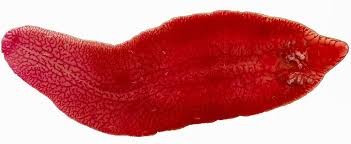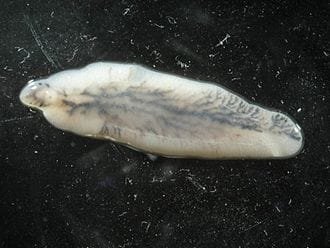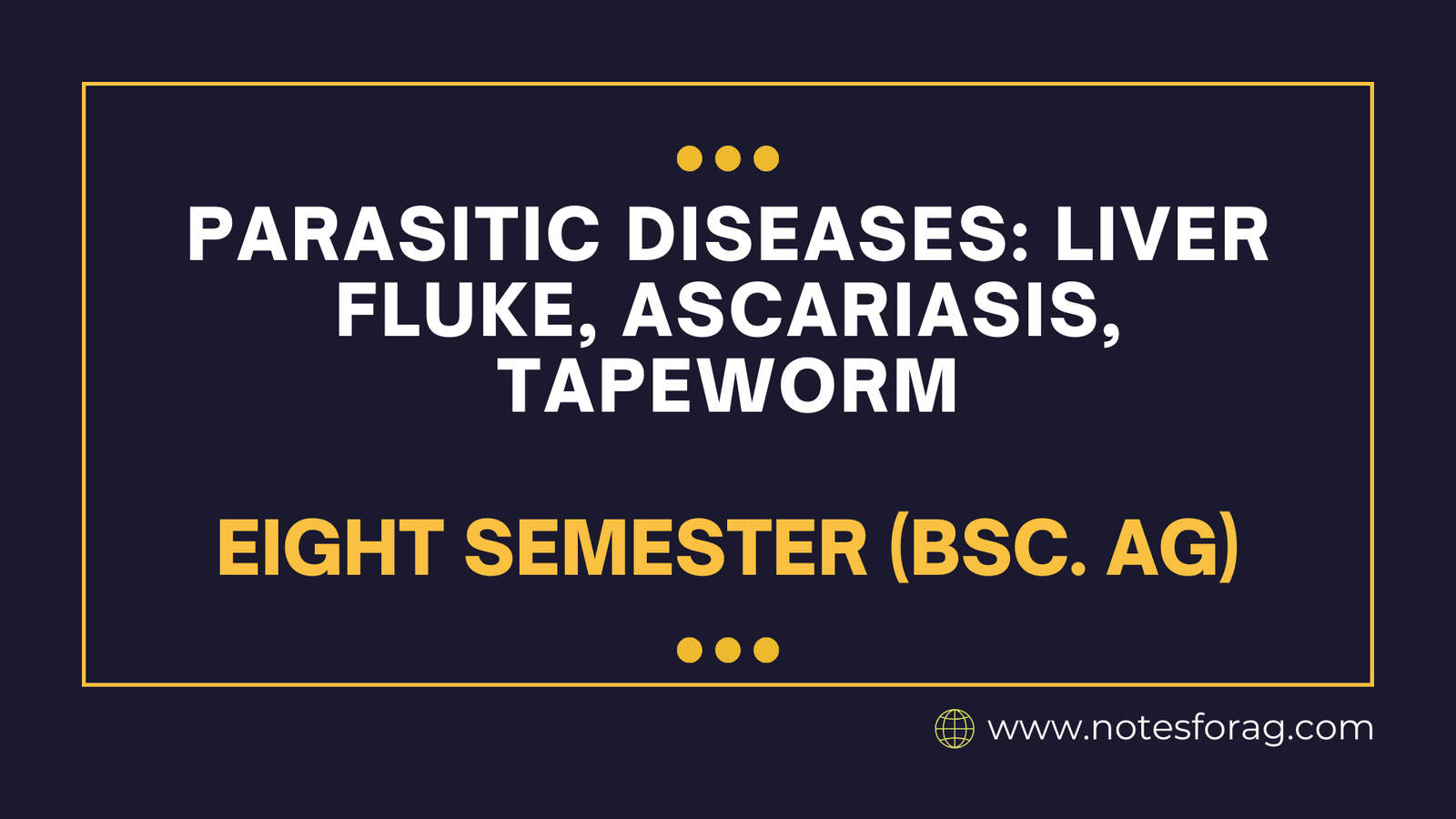Parasitic diseases are caused by organisms that live inside or on animals and take nutrients from them. These diseases are common in livestock, like cows, sheep, and pigs, and can harm their health and affect their productivity. This article explains three common parasitic diseases: liver fluke, ascariasis (roundworm), and tapeworms. We’ll cover what they are, how animals get infected, their symptoms, and how they can be treated or prevented.
Table of Contents
Liver Fluke

What are liver flukes?
Liver flukes are flatworms that live in the liver of animals like cows, sheep, and goats. The two most common species are Fasciola hepatica and Fasciola gigantica. These parasites feed on the animal’s blood and liver tissue.
How do animals get infected?
Animals get liver flukes by eating plants or drinking water contaminated with fluke larvae. Snails play a key role in the fluke’s life cycle. They release larvae into water, and animals ingest the larvae when they eat plants or drink contaminated water.
Symptoms of liver fluke infection
Liver flukes cause a disease called fascioliasis, which leads to liver damage. Signs of infection include:

- Poor weight gain
- Loss of appetite
- Tiredness
- Swelling in the belly (due to fluid buildup)
- Anemia (low red blood cells)
- Diarrhea
- Yellowing of the skin or eyes (jaundice)
If untreated, liver flukes can lead to liver failure or death.
Treatment and prevention
Liver flukes are treated with deworming medications, which can be given by mouth or through injections. Preventing liver flukes involves managing grazing and avoiding wet or marshy areas where flukes are common. Using fluke control programs during high-risk seasons also helps.
Ascariasis (Roundworm Infection)

What is ascariasis?
Ascariasis is caused by roundworms, Ascaris species, that live in the intestines of animals like pigs, cows, and horses. These worms can grow up to 30 cm (12 inches) long and cause significant health problems.
How do animals get infected?
Animals get infected by eating food or drinking water contaminated with roundworm eggs. These eggs come from the feces of infected animals. If animals live in dirty conditions, they are more likely to ingest these eggs.
Symptoms of ascariasis
Ascariasis causes various symptoms, such as:
- Weight loss or poor weight gain
- Diarrhea or constipation
- Stomach discomfort or bloating
- Vomiting (in severe cases)
- Breathing problems (if larvae travel through the lungs before reaching the intestines)
- Poor coat condition
Heavy infestations can cause intestinal blockages and other serious health issues.
Treatment and prevention
Ascariasis is treated with deworming medicines that kill the adult worms. Good hygiene, like cleaning living areas and properly disposing of waste, can help prevent roundworm infections. Regular deworming also helps control the problem.
Tapeworms
What are tapeworms?
Tapeworms are long, flat worms that live in the intestines of animals like cattle, sheep, and pigs. They can grow very large, sometimes several meters long. The most common types are Taenia solium (pork tapeworm) and Taenia saginata (beef tapeworm).
How do animals get infected?
Animals get tapeworms by eating meat that contains tapeworm larvae or eggs. These larvae are found in undercooked meat from infected animals. Once ingested, the larvae grow into adult tapeworms in the intestines.
Symptoms of tapeworm infection
Many animals with tapeworms may not show symptoms, but some may experience:
- Weight loss
- Poor coat quality
- Digestive issues (like diarrhea or constipation)
- Visible tapeworm segments in the feces (they look like small, white rice-like pieces)
- Stomach pain
In heavy infestations, tapeworms can cause intestinal blockages or other serious problems.
Treatment and prevention
Tapeworm infections are treated with medications like praziquantel, which kills the tapeworms. Preventing tapeworms involves avoiding contamination of food and water. Cooking meat thoroughly and maintaining clean living conditions for animals are key to stopping tapeworm infections.
Conclusion
Liver fluke, ascariasis (roundworm), and tapeworms are all common parasitic diseases that can affect livestock. These parasites can cause health problems like weight loss, poor growth, and even death if not treated. The best way to prevent these diseases is by maintaining clean living conditions, providing proper nutrition, and regularly deworming animals. By treating and preventing parasitic infections, farmers can keep their animals healthy and productive.
Frequently Asked Questions (FAQ)
What is a tapeworm infection?
A tapeworm infection is caused by parasitic flatworms of the order Cestoda. Humans typically acquire tapeworms by consuming undercooked or contaminated meat (e.g., beef, pork, or fish) containing tapeworm larvae. The tapeworm attaches to the intestinal walls and can grow to lengths of several meters, leading to symptoms such as abdominal discomfort, weight loss, and digestive issues.
How does Ascariasis spread?
Ascariasis spreads through the ingestion of Ascaris eggs, which are commonly found in contaminated soil, water, or food. Inadequate hand washing after using the bathroom or contact with contaminated surfaces is a major risk factor. Ingesting food or water contaminated with fecal matter containing Ascaris eggs is the primary route of transmission.
Related Articles

